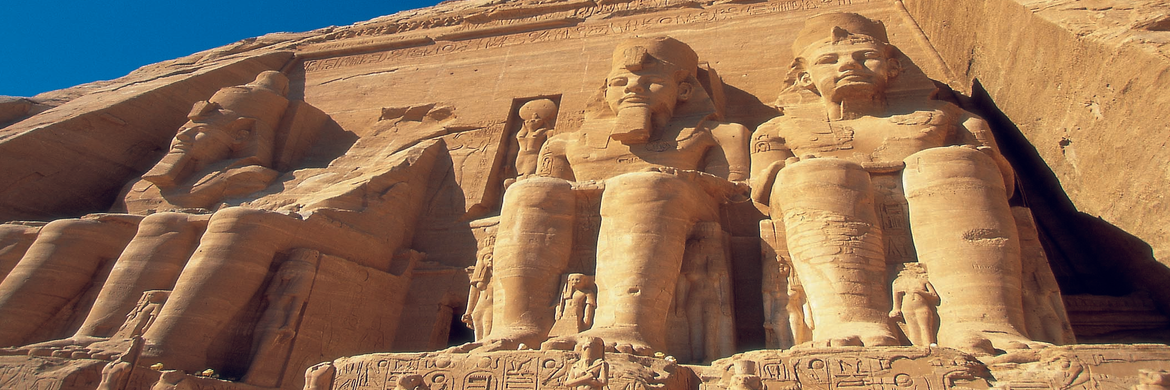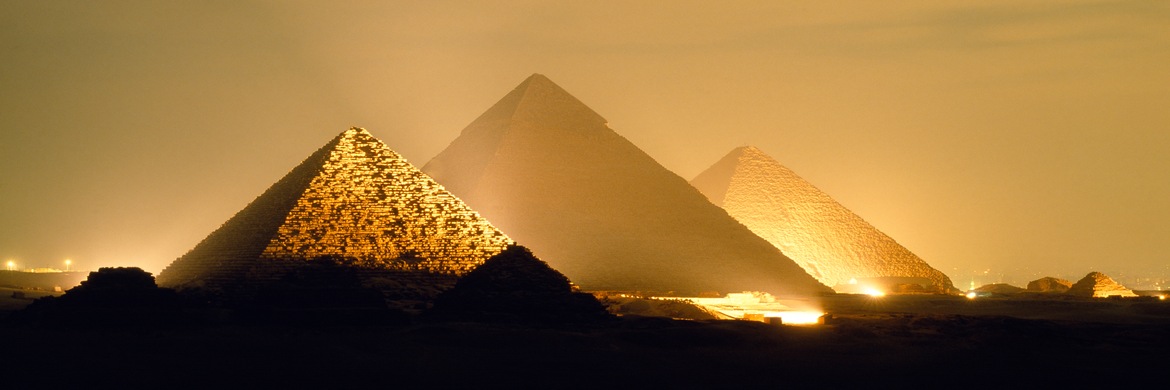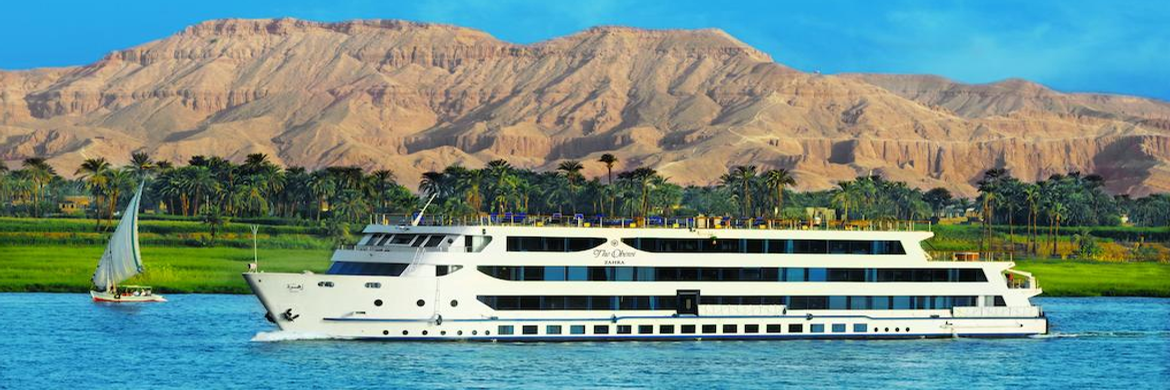Egypt Escapes
Egypt, a country linking northeast Africa with the Middle East, dates to the time of the pharaohs. Millennia-old monuments sit along the fertile Nile River Valley, including Giza’s colossal Pyramids and Great Sphinx as well as Luxor’s hieroglyph-lined Karnak Temple and Valley of the Kings tombs. The capital, Cairo, is home to Ottoman landmarks like Muhammad Ali Mosque and the Egyptian Museum, a trove of antiquities.
Despite ranking in the top 30 largest countries with its 1 million square kilometers of land, Egypt is a country that is notorious for its geographic ‘distribution.’ 99% of Egypt’s population utilizes only 5% of the total land area but nearly 100% of its aquatic resources as a result of the predominantly barren ecosystem. The lifeline of some 90 million human beings, the river Nile is the focal point of urban planning, an incredible 6,695 km gift of sustenance for Egypt and three other countries, making it the longest, and arguably most vital, river in the world.
The Nile enters Egypt a few kilometers north of a Sudanese town called Wadi Halfa through a narrow canyon that traverses sandstone and granite cliffs. The northward flowing direction of the river has thus earned Egypt’s southern border the name “Upper Egypt.” Within this stretch of the Nile is the world’s most intensive concentration of temples, tombs and palaces constructed over the span of 4,000 years. This includes the temples of Abydos, Dendara, Karnak, Esna, Edfu, Kom Ombo, Philae and Abu Simbel, each conceived for their respective deities, further to the tombs in the Theban Necropolis within the Valley of the Kings across the river from Luxor.
Much like the Nile, the Red Sea coast, a once microcosm of the world that hosted sailors from far away lands, has also become a pivotal part of the country. Turquoise waves break against rocky capes and windswept beaches in the foreground of an endless mountain range, a much needed escape for the people of Cairo. The real lure here, especially for the non-locals, are the fabulous island reefs near the resort of Hurghada and the smaller settlements of Port Safaga, El-Quseir and Marsa Alam to the south. This entire region saw a rapid transformation in the past two decades, catalyzed by surges of annual tourists, with the most notable development being the future construction of Egypt’s new capital city near this coastline.
These destinations pack a powerful punch when it comes to travel-seeking vacationers. Shark-diving, snorkeling, and kite-surfing are complemented by the revitalizing effects of 18-hole golf courses, private beaches, open-air cinemas, and unrivaled night life scenes.
Egypt is also well known for its captivating entertainment. Belly dancing, or oriental dancing as it’s formally known, is a longstanding part of Egyptian culture permeating all facets of life, from cabarets to the most extravagant weddings. These cultural performances extend to the Sufi whirling dervishes and the famous tanoura.
In keeping with the oriental rhythm, Egyptians speak the official language, Arabic. While modern standard Arabic is used in television, government speeches, and educational institutions, Egyptian ‘colloquial’ Arabic is the common form that is universally understood, especially across the Middle East due to Egypt’s prominence in the film industry.
CAIRO
Fond of the Coptic culture about 30 minutes to reach the area of old Cairo where we spend about two hours visiting the hanging church and another seven churches, the Coptic Museum & the synagogue. We drive to Khan El khalili Bazaars for one hour to explore the area a new taste and unforgotten experience. You can also visit Old Cairo area whereby the famous Mosques of Sultan Hassan, Ibn Toulon & Refae are located at the footsteps of the citadel. The guide will show us around the 3 mosques which would last about one and a half an hour. Then you will explore Gayer Anderson museum for an hour free strolling around the area.
LUXOR
Once an Ancient Egyptian capital, is known today as the world’s “greatest open-air museum.” From the tomb of Tutankhamen in the Valley of the Kings and the magnificent sunset views at the majestic temple complexes of Karnak and Luxor to the exciting and fun Nile cruises, Luxor is the perfect choice for culture vultures. Luxor is divided by the Nile into two areas commonly called the East Bank and West Bank which were considered in Ancient Egyptian times as symbolizing respectively Life and Death. While the East Bank has grown to become a modern city, it has retained its lush green setting, its traditional bazaar and stunning view of the Nile. The East Bank boasts some of Egypt’s most refined hotels, home to amazing Spa’s and a golf course. The West Bank is known for its necropolis and mortuary temples: the Valley of the Kings, the Valley of the Queens, the Workers Village, and the Temple of Medinet Habu are the highlights of Luxor’s West Bank.
ASWAN
This charming town is Egypt’s most southern and oldest town since Pharaonic times it has been the trading center and Egypt’s gateway to Africa. The High Dam is Egypt’s modern wonder. Exploring the beauty of the Elephantine Island while riding the traditional wooden felucca is the ambiance you need to unwind from the day to day stress back home. It has been said that a walk around the exquisite Temple of Esna is just the right medicine for your soul. The High Dam is Egypt’s modern wonder. A felucca ride takes you to the many islands, among them, is the famous Philae Island with the temple dedicated to Isis. Located about 899 km south from Cairo, Aswan is a serene Nile Valley destination where the Nile is more majestic than anywhere else, flowing through granite rocks, and round emerald islands covered in palm groves and tropical plants. It is considered as an all-time favourite winter destination. Moreover, you’ll be surprised to see how many monuments and sites this small city has to offer.
ABU SIMBLE
The very small village of Abu-Simbel lies 280 km south of Aswan, and only 40 km north of the Sudanese border. Even though it is home to several hotels, the small town is usually overlooked by tourists as a holiday destination. Most of them prefer to visit the Nubian town on a daytrip from Cairo or Aswan or as an extension to a Nile cruise or a Lake Nasser Cruise. Perched atop a hill overlooking the Nile, the majestic Abu-Simbel Temples are a UNESCO World Heritage Site. Dedicated to Ramses II & Nefertari, the world-famed temples will take your breath away. After a visit to this inspiring site, you can walk around the colorful touristic market, go bird watching on the Lake Nasser, and get back to the temples again in the evening for the amazingly inspiring sound & light show.
HURGHADA
Once a tiny fisher village, Hurghada now spans over 40 km of pristine coastline. Hurghada City has year-round sunshine, incredibly beautiful coral reefs and dozens of exciting attractions in a laid back, relaxed atmosphere. The clarity of the water and the endless opportunities for divers make Hurghada the center for leisure tourism in Egypt and a successful destination for divers and swimmers. Even though it’s known as a top-three diving destination on the planet, it still has something for everyone, even the non-divers: beach fun, extreme water sports, clubbing and golfing are only some of the options you’ll have to choose from. You can also enjoy an amazingly relaxing holiday by booking a treatment or two at one of Hurghada’s best Spas.
SHARM EL SHEIKH
Located at the southern tip of the Sinai Peninsula, boasts the widest array of fun, exciting and even crazy water and extreme sports: besides diving, snorkeling, sailing, wind and kite-surfing, you can even try sky diving or parachuting from a helicopter on your next holiday in Sharm El Sheikh. With its stunning coral reefs and colorful fish, Sharm el Sheikh is a paradise for those who like diving and snorkeling. Sharm el Sheikh was recently awarded as the world’s best diving destination. The famous Nature Park Ras Mohamed is a short distance away, Tiran Island lies just ahead. But Sharm has more to offer than super diving. Innumerable leisure facilities from snorkeling, water sports to golfing or quad biking in the desert are offered.
- Classical Tours – Classical Tours bring you face to face with ancient Egypt’s fabulous and famous antiquities. Most tours start in Cairo, with the Pyramids of Giza making a breath-taking entrance, coming into view within a skyline of high rises. Heading south, (often by Nile Cruise) your next stop explores Egypt’s ancient city of Luxor and of course Aswan and Abu Simbel. Classical tours also allow you to enjoy the ambience of the Mediterranean seaside town of Alexandria, packed with historical and modern culture – and you can even make a foray into the incredible, unspoilt beauty of the (white) Western Desert and Siwa, a date palm oasis.
- Feel the Luxury – From the finest rooms in the most luxurious hotels – to the plushest suites on a Nile Cruise. You’ll be given the personal number of our staff should you have any special requests – and you’ll have a private driver for all journeys and transfers. You’ll even have your very own, personal Egyptologist guide. Whether you’re visiting the Red Sea or the Valley of the Kings, you’ll be treated like royalty.
- Sun, Sand & Sea – Golden sandy beaches and sparkling turquoise waters, or endless desert dunes, or quad biking, diving the amazing coral reefs of the Red Sea or floating on the healing mineral salts of the Dead Sea? We have a wide range of activities such as diving, snorkeling, trekking, sailing, windsurfing, hot-air ballooning, golfing and much more.
- Adventure & Safari – Diving, kite-surfing, trekking by camel and even hot air ballooning are just a few of the activities on offer – and all available in many destinations. Or your choice can easily be customized with one of our tailor-made holidays. It all adds up to a spectacular, exciting and unforgettable holiday.
- Family Gateways – Keeping all the family happy can be difficult – with children’s ages and interests to hotel facilities and entertainment all to be considered. You could be dining on a Nile Cruise or riding a hot-air balloon, making a desert safari or riding a camel, climbing Mount Sinai to see the dawn, or plunging into the fabulous underwater world of the Red Sea – with all the comfort and fun your family desire
- Religious & Spiritual – Our Christian Heritage tours include churches and tombs which have only just been discovered and opened to the public – profoundly important for students of ancient biblical history. One of our most popular tours traces the footsteps of the Holy Family into Egypt and visits the very places where Joseph, Maria and baby Jesus sheltered.
- Festivals & Events – Egypt is not only about world-renowned architectural attractions and sandy beaches with multicolor reefs of the Red Sea – its religious and cultural diversity is clearly reflected in the many different annual festivals, fairs, concerts, exhibitions, celebrated Islamic and Christian holidays as well as historical dates. You can witness the most popular Sun Festivals in Abu Simbel or Fayoum and almost unknown traditional Garlic Festival in the remote Siwa Oasis; attend South Sinai Camel Festival with speedy races or one of the most impressive Art Festivals in the Arab World.
- Luxury Nile Cruises – Breathtaking panoramas, excellent amusing programs, romantic atmosphere, luxury and coziness – this is what the cruise on the longest river in the world assures. Don’t miss the luxurious Nile Cruise. These cruise either sailing out of Luxor OR Aswan. It is not only the history that will capture your heart… Imagine being into the Nubian houses by the side of the Nile, unique and rare gardens, colorful souqs to watch in Luxor & Aswan.




